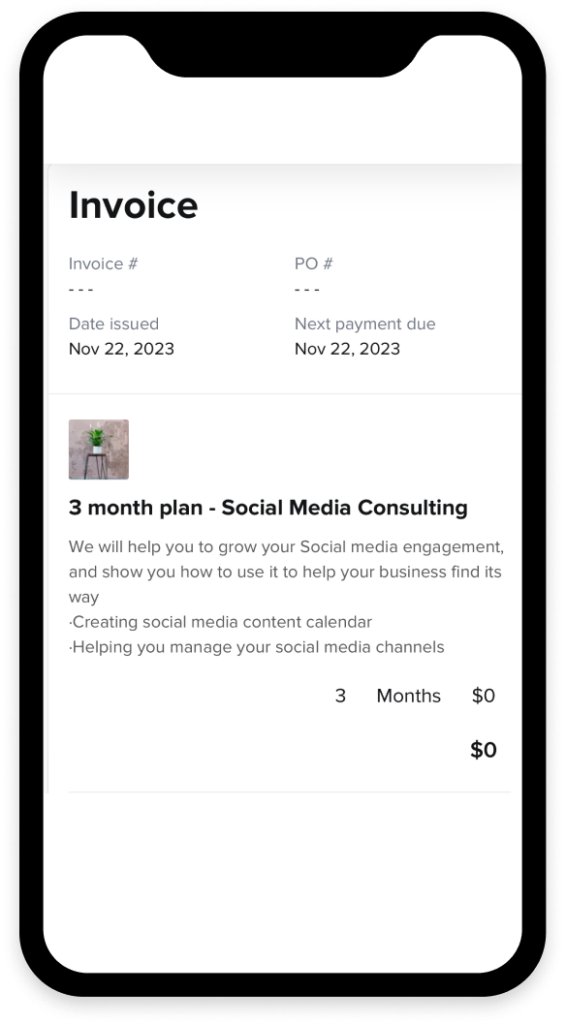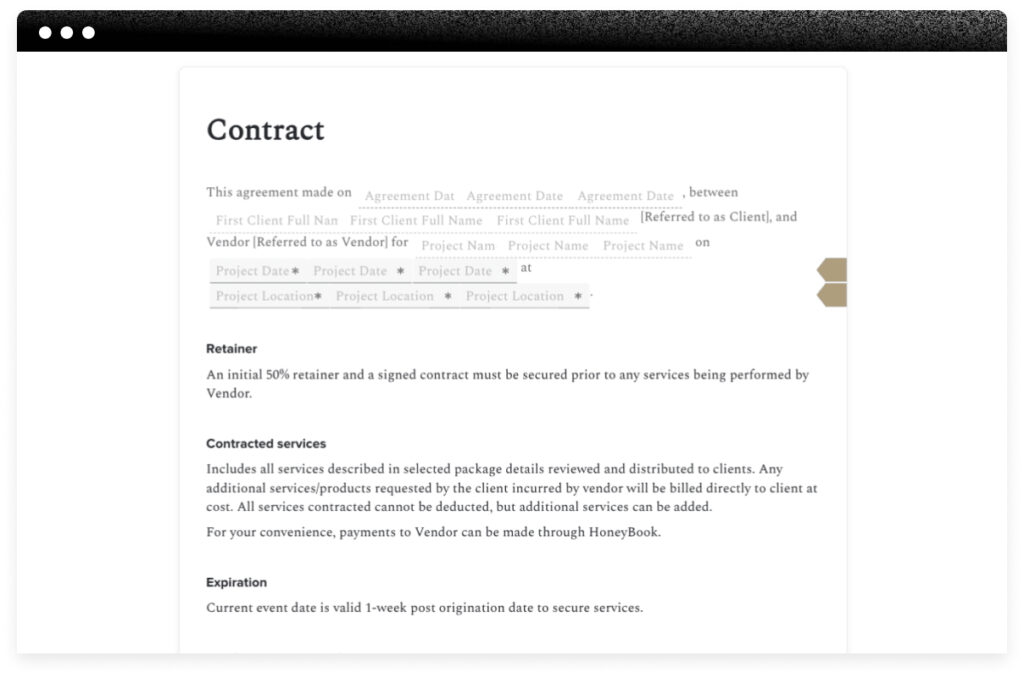HoneyBook is a clientflow management platform that provides a variety of small business tools. It’s used for overall business management and can support different types of independent businesses. Learn more about how all types of businesses use HoneyBook.
Every independent business owner knows that managing the growth of your business and meeting customer demand quickly is essential to long-term success. No matter how small your team may be (it may just be you!), delivering the same quality of services as you scale up your business can create a number of challenges.
So how do you juggle the demands and requirements of a growing small business, continuing to innovate, and ensuring clients receive a consistent experience?
The best solution is a clientflow management platform, and HoneyBook is the leading option for independent businesses. Regardless of business type, HoneyBook is used for streamlining all of your client interactions as well as the work that goes into providing excellent services.
With HoneyBook, you get multiple business tools in one platform:
- Workflow automation – Automating and completing repetitive tasks to free up your time for more important duties
- Bookkeeping and invoicing – Invoice your clients, collect payments, and track your revenue and sales
- Meeting scheduling – Manage your business calendar and let clients schedule consultations, sessions, meetings, and more
- Online payment processing – Process secure transactions and allow clients to use a variety of payment methods to improve user experience
- Communications – Use a single, efficient platform for communicating with team members, clients, potential leads, and collaborators
- Contract management – Generate, sign, and store professional and legal contracts that are necessary for your small business operations
- Template creation and management– Along with invoices and contracts, access file templates for each step of your clientflow, including sales, client onboarding, project closure, and more
These are just a few of the features that can help you manage your small business with HoneyBook. Let’s look more into detail at some of the small business industries that benefit from HoneyBook.
Jump to:
- HoneyBook for marketing providers
- HoneyBook for creative professionals
- HoneyBook for business service providers
- HoneyBook for event industry professionals
- Use all of your tools in one platform with HoneyBook
HoneyBook for marketing providers: Designers, copywriters, social media managers, etc.

Marketing is an expansive industry that includes fractional CMOs, social media consultants, SEO agencies, web designers, and more. Nearly every type of business needs some type of marketing support, so these businesses are in a lucrative niche.
However, freelancers and business owners in this market often find themselves competing with a crowded market as well as corporate teams. This means staying organized and providing quality services is essential for smaller firms and individuals to continue finding and landing contracts.
So how can you use HoneyBook to help your marketing business compete?
- Proposals and scoping– As a marketing provider, you often need to take a hands-on approach to scoping projects with your clients. With HoneyBook, you can use editable proposal templates that allow you to include your services and contracts, which you can review with clients until you reach an agreed-upon scope.
- Invoicing and payments – Custom HoneyBook invoices allow you to create professional, detailed bills for clients that also include payment processing. HoneyBook invoices give you worthwhile features like custom payment schedules, recurring billing, auto-pay, and automatic payment reminders. Once you send an invoice, you can track paid, upcoming and overdue payments in one place.
- Scheduling and client communication– Scheduling is essential for coordinating meetings, kick-off calls, and check-ins with clients or business partners. HoneyBook’s online meeting scheduler lets you set your availability for specific types of meetings or sessions, eliminating back and forth when it comes to finding the best time to connect. You can also manage all of your client communication in one place via email and SMS, and even track when your messages are read.
- Automation – In any small business, process automation is part of how you’ll be able to grow your business. HoneyBook can help you automate your busy work so you can focus on more important tasks.
HoneyBook for creative entrepreneurs: Artists, graphic designers, decorators, photographers, etc.

One of the main attractions of being a creative professional is the chance to set your own hours and make your own decisions while doing a job you truly love.
Whether you are a photographer catching memorable moments, a designer helping shape the inside of a home, or an artist looking to bring your work to a wider audience, creative professionals thrive off freedom from the typical business life.
However, small business owners working in this space often find the flexibility and ability to create what they love can be overshadowed by the tedious needs of maintaining the books and handling business logistics. This is where HoneyBook can help — by opting for a suite of smart tools for small businesses, you can focus on the part of the work you love while letting the platform take care of the details. For example:
- Lead tracking – Undoubtedly, you’re getting interest in your work from all different channels like Instagram, Facebook, your website, word of mouth, and more. It’s amazing, but if you don’t have a place to funnel leads and follow up with them, they might as well not exist. HoneyBook’s lead management enables you to capture leads and understand where they’re coming from. You can also use automations to reply to inquiries faster.
- Sales collateral – Selling services often means selling yourself. You’ll likely need a sleek, convenient, and digital method to showcase your work and book clients. HoneyBook’s interactive file templates let you create beautifully branded brochures, pricing guides, and proposals. With endless customization, you can create all different types of sales files to suit your needs.
- Invoicing, payment processing, and bookkeeping– Make it easy on yourself, your accountant, or your bookkeeper by collecting all of your sales, invoices, and expenses in a single system. HoneyBook also integrates with QuickBooks so that you can sync your HoneyBook payments with all your other accounting data.
HoneyBook for business service providers: Business coaches, virtual assistants, consultants, etc.

Even in the world of big corporations, there’s still an ecosystem of small business professionals who provide the essential services needed to support large organizations’ operations. From virtual assistants to consultants and business coaches, many individuals have found success and increased demand for niche services that corporations prefer to outsource and hire on a per-contract basis.
Whether you’re working for corporations or other small businesses, business service providers need to be organized and professional to meet clients’ expectations. The best way to help ensure this happens for your business is to HoneyBook’s clientflow platform and these helpful tools:
- Qualification– For business service providers, it’s important to make sure you and your clients are a good fit. After all, your projects are entirely relationship-based. With HoneyBook, you can use lead forms that include qualifying questions or build questionnaires that weed out leads who aren’t a good fit.
- Proposals – Deliver professional proposals that show clients why they should work with you.
- Professional contracts – Use attorney-reviewed online contract templates and collect eSignatures from stakeholders to ensure legal compliance. Plus, track all your contract versions and edits online.
- Calendar/scheduling– If you require a screening call, consultation, or even just want to schedule client meetings, HoneyBook’s online scheduler will make it easier for all parties.
- Invoicing and payment processing– If you only need to accept payments, something like PayPal might work, but if you want to create a more professional client experience, you may want a billing system specifically for managing client relationships, like HoneyBook. Accept payments via credit card or ACH bank transfer with some of the lowest fees in the industry.
- Client communication – Send reminders and notifications to help with client management, an essential tool when working with a large business or a corporate team. Tools like HoneyBook are great for ongoing communication along with maintaining your contracts, invoices, onboarding documents, and more.

HoneyBook for event industry professionals: Event planners, caterers, florists, DJs, etc.

No one understands the importance of staying organized more than event industry professionals. When your business is based on helping events happen as planned, lacking organizational skills can mean a quick end to your time in the market.
Event professionals know that staying on top of your various clients and the stages of their upcoming events can be a headache during the busy season. That’s where HoneyBook can help with the following tools:
- Online payment software – Coordinate payments with clients for all types of events, including deposits and cancellation fees.
- Communications and planning tools – Organizational tools are useful for working with both event attendees and vendors. With HoneyBook, you can assign specific permissions to vendors to enable more effective collaboration. Also, save all your client communications and files in one place for easy access.
- Contract management – For an industry that is driven entirely by contracts, an intuitive online contract management platform is essential to protect your business and your customers.
Access all of your small business tools in one platform with HoneyBook
For any of these industry professionals looking for a comprehensive, dynamic set of small business tools, HoneyBook is a perfect option for you. With an all-in-one platform that offers everything from online payment processing to contracts, scheduling to online invoices, and other key small business needs, HoneyBook can be a simple and elegant solution to helping your independent business grow.






